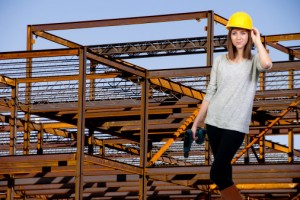 Men account for the overwhelming majority of construction workers. But about 9% of all construction workers are women. And though construction workers, no matter the gender, face the risk of being involved in a serious construction accident, female construction workers often face unique challenges in accident prevention.
Men account for the overwhelming majority of construction workers. But about 9% of all construction workers are women. And though construction workers, no matter the gender, face the risk of being involved in a serious construction accident, female construction workers often face unique challenges in accident prevention.
Recently, the Occupational Safety and Health Administration (OSHA) announced an alliance with the National Association of Women in Construction (NAWIC) in order to develop better training resources to help prevent accidents among female construction workers. According to a brief on the OSHA website, the focus will be on “musculoskeletal and sanitation hazards and issues related to poorly-fitting PPE.”
“Safety and health problems in construction create barriers to women entering and remaining in this field,” said OSHA’s Assistant Secretary Dr. David Michaels. “Through this alliance, we will work together to forge innovative solutions to improve the safety, health, and working conditions for women in the construction trades and retain female workers during a critical time of job shortages in this industry.”
One of the most important aspects of job safety for women in construction is properly fitting personal protective equipment (PPE). In many cases, safety equipment and clothing is designed for men and doesn’t provide a proper fit for a woman. When PPE doesn’t fit well, it cannot protect as it should, putting women at undue risk.
Ideally, employers should purchase safety gear and equipment that is made specifically for women alongside that made with men in mind. One size does not fit all when it comes to equipment designed to keep you safe in the event of an accident.
Another common and less-talked-about safety concern among women in construction is sanitary facilities. Many female construction workers refuse to use the restroom facilities on their job site due to a number of factors, including unsanitary toilet seats, non-working locks, and the like. Again, it’s the employer’s responsibility to ensure all workers have access to sanitary facilities.
When an accident happens, it doesn’t matter whether you are a man or a woman, the effects can be long-lasting. Though it’s your employer’s responsibility to help keep you safe, you are the one who suffers when an employer drops the ball.
New York and New Jersey Construction Accident Attorneys
If you’ve been hurt in a serious construction accident, contact the construction accident lawyers of Ginarte today. Call us to discuss your injuries and your legal options at (888) GINARTE.
